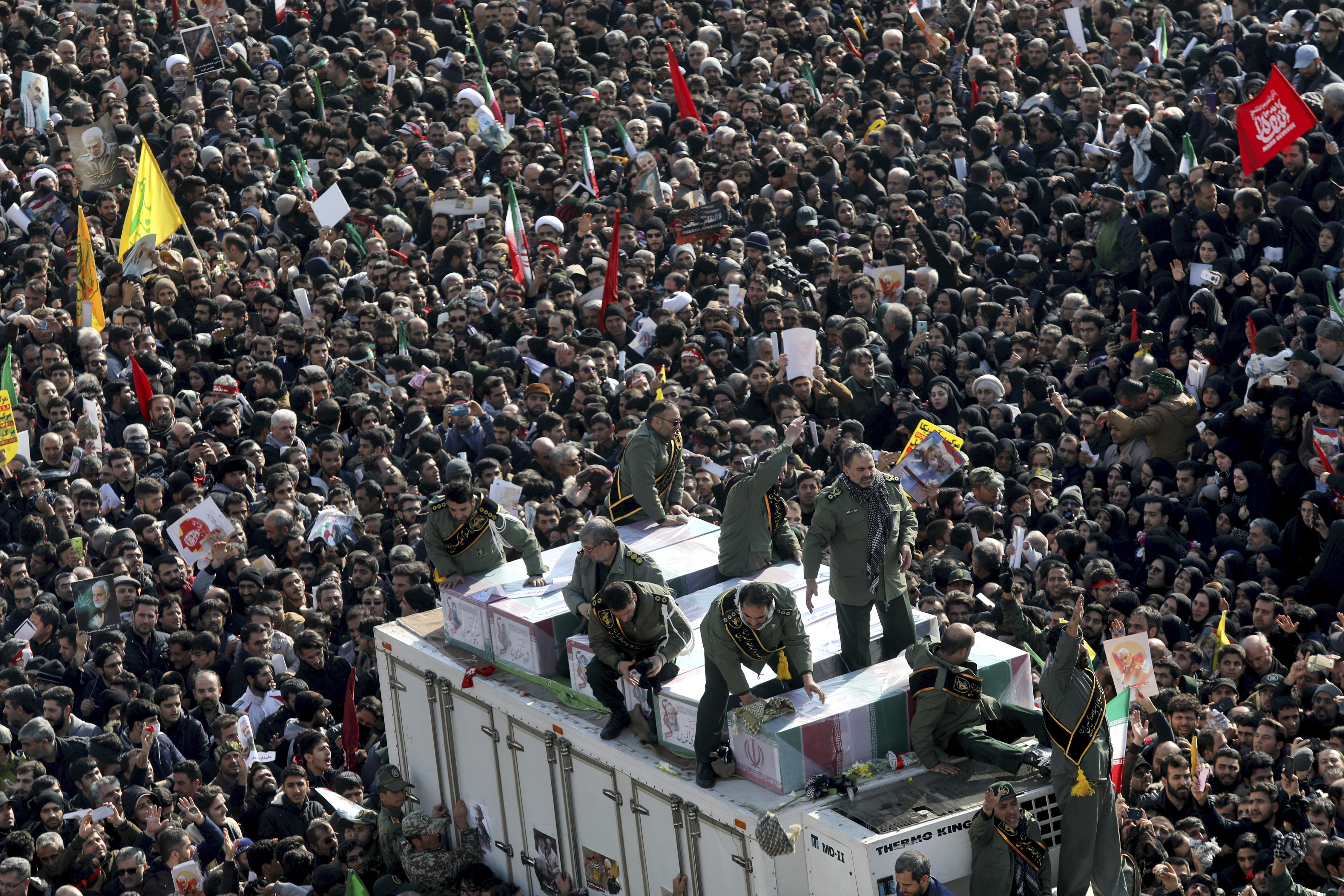Here’s Everything You Need to Know About the Situation in Iran Right Now

Credit to Author: David Gilbert| Date: Mon, 06 Jan 2020 13:28:22 +0000
The daughter of slain Iranian general Qassem Soleimani threatened to kill U.S. soldiers based in the Middle East, promising that “the families of the American soldiers in western Asia will spend their days waiting for the death of their children.”
Massive crowds crammed into the streets of Tehran on Monday chanting “Death to America” at the funeral of Soleimani, who was assassinated by a U.S. drone strike on Friday. Ayatollah Ali Khamenei, Iran’s supreme leader, wept openly over the coffin while the general’s successor once again vowed vengeance.
“God the almighty has promised to get his revenge, and God is the main avenger,” Esmail Ghaani, who was appointed as leader of the elite Quds Force hours after Souleimani’s assassination, said. “Certainly actions will be taken.”
When Soleimani’s daughter, Zeinab, addressed the crowd, she made a much more direct threat against U.S. troops stationed in the Middle East.
“You crazy Trump, the symbol of ignorance, the slave of Zionists, don’t think that the killing of my father will finish everything,” she said in front of the crowd of thousands. “The families of the American soldiers in western Asia will spend their days waiting for the death of their children.”
Iranian state television, which put the number of mourners in the “millions”, also shared a video showing the U.S. flag tweeted by President Donald Trump after Souleimani’s killing turned into a flag draping a coffin and the “likes” of the tweet replaced by over 143,000 “killed” with the hashtag #severerevenge.
The funeral took place hours after Iran announced that it would no longer abide by any uranium enrichment limits imposed by the 2015 Iran nuclear deal, setting off fears that it could begin production of an atomic bomb.
READ: Here's what war with Iran would actually look like
A few hours earlier, Trump warned Iran that the U.S. would retaliate against any attack Iran makes "perhaps in a disproportionate manner” and that his administration had targeted 52 locations — including cultural sites — which the U.S. would "strike very fast and very hard."
Responding to criticism of his threats to target cultural sites, Trump doubled down in comments on Sunday night.
READ: Young Iraqis aren’t sad Soleimani is dead. But they worry they’ll pay the price
“They’re allowed to kill our people. They’re allowed to torture and maim our people. They’re allowed to use roadside bombs and blow up our people. And we’re not allowed to touch their cultural sites? It doesn’t work that way,” Trump told reporters aboard Air Force One, dismissing warnings that attacking cultural sites would be a war crime under international law.
The killing of Soleimani, in a drone strike at Baghdad airport, is causing reverberations not just for the U.S. and Iran, but across the Middle East.
On Sunday, the Iraqi parliament passed a non-binding resolution to remove U.S. troops from the country. There are currently around 5,000 troops stationed in Iraq as part of an international coalition fighting ISIS.
Trump responded angrily to the news, telling reporters that the U.S. would only leave if Baghdad repaid the billions of dollars the U.S. had invested in building bases in the country, and if that didn’t happen, then Iraq would face severe sanctions.
“We will charge them sanctions like they’ve never seen before ever. It’ll make Iranian sanctions look somewhat tame,” he said. “If there’s any hostility, that they do anything we think is inappropriate, we are going to put sanctions on Iraq, very big sanctions on Iraq.”
Iraq’s Prime Minister Adil Abdul-Mahdi also made a surprising revelation during the hearing in parliament on Sunday evening. “I was supposed to meet Soleimani on the morning of the day he was killed, he came to deliver me a message from Iran responding to the message we delivered from Saudi to Iran.”
READ: U.S. cyberattack on Iran just put a target on American businesses
The revelation that Riyadh and Tehran, bitter rivals, together with the United Arab Emirates, were in the early stages of mediation would have been a surprise to many. The killing of Souleimani may have ruined any chance those talks had of succeeding.
“The U.S. should have welcomed this development,” Trita Parsi, executive vice president of the Quincy Institute, a Washington-based think tank, told VICE News in an email. “But the killing of Soleimani may have at the same time killed that effort and once again given Saudi Crown Prince Mohammed bin Salman and the Emiratis a license to continue recklessness and destabilization.”
Cover: Coffins of Gen. Qassem Soleimani and others who were killed in Iraq by a U.S. drone strike, are carried on a truck surrounded by mourners during a funeral procession, at the Enqelab-e-Eslami (Islamic Revolution) square in Tehran, Iran, Monday, Jan. 6, 2020. The processions mark the first time Iran honored a single man with a multi-city ceremony. Not even Ayatollah Ruhollah Khomeini, who founded the Islamic Republic, received such a processional with his death in 1989. Soleimani on Monday will lie in state at Tehran's famed Musalla mosque as the revolutionary leader did before him. (AP Photo/Ebrahim Noroozi)
This article originally appeared on VICE US.